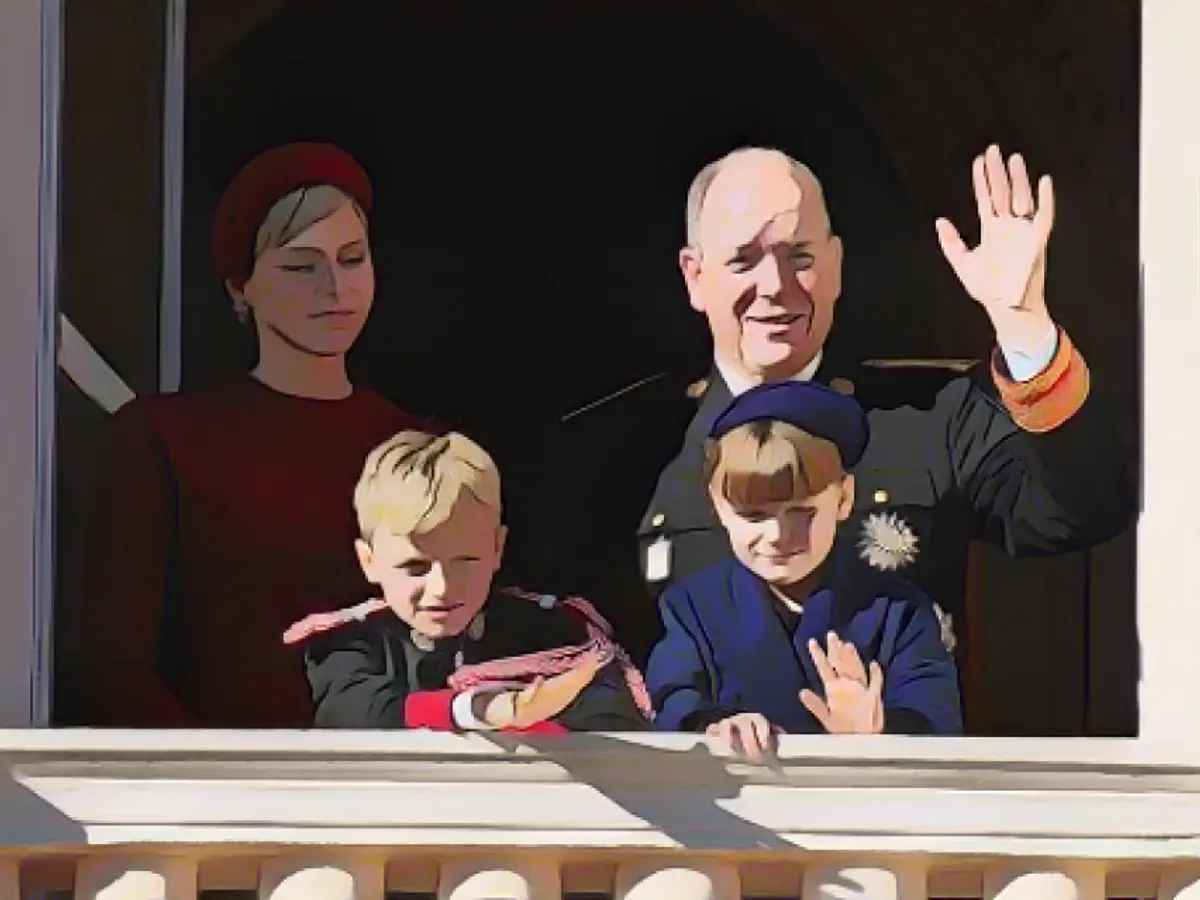On the royal road - Suddenly socially acceptable - illegitimate princely children on the road to equality
The British society magazine "Tatler", known for its coverage of the British aristocracy since 1709, is devoting its cover story this month for the first time to the illegitimate child of a regent - Alexandre Grimaldi, the 20-year-old son of Prince Albert of Monaco.
This is unusual because the illegitimate offspring of princes are often kept secret. If their existence does come to light, it is usually a scandal, accompanied by legal action, forced paternity tests and lurid tabloid reporting. The unwilling fathers (because it is usually male and not female monarchs who have offspring "on the side") naturally also fear trouble with their married wives and blue-blooded clan if they admit to the living proof of their infidelities.
Albert of Monaco and his offspring
After the birth of Alexandre, it was also a problem for Prince Albert as to how he should deal with his son and his mother Nicole Coste. The stewardess of French-Togolese origin had met the then heir to the throne of Monaco while on duty on an Air France flight. This was followed by a secret affair lasting several years. At the time, Albert was not yet married, but was already in a relationship with the South African competitive swimmer Charlene Wittstock, his current wife. When Albert's mistress became pregnant and gave birth to his child, he is said to have promised her that he would recognize and care for it as soon as possible. However, he was initially only able to keep the financial part of his promise. Rumor has it that his father Prince Rainier forbade him to publicly acknowledge the child as his own.
Access to all STERN PLUS content and articles from the print magazine
ad-free & can be canceled at any time
Test for 30 days for €1
Already registered?
Log in here
His fear was probably that Alexandre could actually have a certain claim to the Monegasque throne due to the laws of succession still in force in the principality at the time; at least as long as there was no legitimate child of Albert. As a result, the Monegasque heir to the throne initially only paid for the mother of his child to have an apartment in Paris befitting her status and for his son's education. It was only when he became Prince after his father's death in 2005 - and another child from another relationship with an American woman had appeared in the meantime, namely daughter Jazmin Grace, born in 1992 - that Albert was in a position to recognize his two children. By this time, the unclear Monegasque law on succession to the throne had already been amended in favor of exclusively legitimate offspring. However, the sudden "addition to the family" was not met with great enthusiasm by either his subjects or Charlène.
Nevertheless, the relationship between father and illegitimate children is said to have developed very positively since then. Over the past few months, there have been repeated photos on social media of Albert spending time with Alexandre and Jazmin Grace, apparently posted with the Prince's approval.

However, the Prince married Charléne in 2011, made her Princess and had twins Jacques and Gabriella with her - as the legitimate heirs to the throne. According to rumors from court circles, the Princess's relationship with her husband's illegitimate children is still not particularly cordial. Nevertheless, Albert has meetings with all his children, including Prince Jacques and Princess Gabriella, both of whom are now nine years old. There are also pictures of them on social media. The message is clear: the Prince himself makes no distinction between legitimate and illegitimate when it comes to his four children.
Alexandre, future Monaco ambassador?
Nevertheless, it is initially surprising that Alexandre, who, like his sister Jazmin Grace, can officially call himself Grimaldi by his surname but has no title, is now apparently seeking publicity with the consent of his princely father and has given a large-scale interview to the "Tatler".

In it, he talks enthusiastically about the big plans his father has for him. He would soon be moving to New York after completing his schooling in London. If you look at the photo shoot for the interview, in which the young man presents the latest fashions from various designers, you might assume that he is aiming for a career as a model. However, Alexandre explains that the Prince has already introduced him to the highest business and political circles in Monaco and that his training enables him to be a serious representative of the Principality abroad. Alexandre also finds it inappropriate that he is usually referred to as the illegitimate offspring of Albert.
"When I was born, neither of my parents were in another marriage, they didn't commit adultery," he argues. Alexandre sees himself on an equal footing with the Princely Family: "I want to work with my father and { ... } become a global ambassador for Monaco, bring international business interests to Monaco. I have spoken to him about this," says the young Grimaldi. He is obviously aiming for a representative role that would traditionally be seen more in the hands of heir to the throne Prince Jacques, who is far from being old enough for it.
Delphine of Belgium's successful fight for recognition
Things were more difficult in a similar case in the Belgian royal family: for a long time, it was an "open secret" in Brussels' best circles that the sculptor Delphine Boël was the daughter of King Albert II of Belgium. It was said that she was the result of an affair that the King had with a Belgian aristocrat named Baroness Sybille de Selys Longchamps from 1966 to 1984, at the time during a marriage crisis with his wife Paola. Throughout her childhood and youth, Delphine herself was unaware that ex-King Albert was her father, knowing him only as the nice acquaintance of her mother who always liked to play with her. For her, her mother's divorced husband, Jacques Boël, was her dad.
Delphine only found out the true identity of her father from her mother when she was 18. She then spent years fighting in court for recognition of her relationship to her biological father and for the corresponding name and title - and won her court case to establish paternity. A DNA test ordered by the court in 2018 was positive, but only became public knowledge in 2020. Since October 2020, Albert's illegitimate daughter can now call herself Her Royal Highness, Delphine of Saxe-Coburg and Gotha, Princess of Belgium. She is now even allowed to appear with the royal family every year at the military parade on National Day.
Albert and his wife Paola even had their picture taken with their newly adopted daughter with a slightly tight-lipped smile. And it is rumored from court circles that she was indeed warmly welcomed by her royal relatives: Whenever there is a party or family gathering at the palace in Brussels, Delphine, her partner and their two children Josephine and Oscar are now always invited. So a happy ending after all for the royal daughter from a secondary relationship, albeit a hard-won one.
Role model in the story: King Charles II.
However, there have been role models in the history of some royal houses for rulers recognizing their offspring born outside the marriage bed as their flesh and blood and even honouring them with titles, honours and official duties. Charles II, namesake and predecessor to the current King of Great Britain in the late 17th century, was blessed with no official heirs despite his long marriage to a Portuguese princess. He therefore consistently appointed all the sons he had fathered with various mistresses as dukes while they were still children and ensured their advancement in the world.
Even the quasi-royal daughters did not go away empty-handed; they were recognized by the king, given eloquent artistic surnames such as "Fitzcharles" or "Fitzroy" and then married off to worthy aristocrats as soon as possible so that they were properly provided for. In particular, he gave one of his sons with his favorite mistress, a French noblewoman Louise de Kérouailles, the title of Duke of Richmond and gave him an upbringing that would have done credit to any prince. Later, Charles Richmond was also able to serve in various high posts in the British army and act as a confidant to the future King William III.
A princely concession to social change?
In this respect, Prince Albert of Monaco's dealings with his illegitimate first-born Alexandre are nothing new or unheard of, even if the implied plans to appoint the young Monsieur Grimaldi as an official representative of the Principality may seem unusual.
But perhaps Albert has just realized that in today's world, which is heavily influenced by (social) media, it would no longer be possible to hide children from infidelities for long anyway. In that case, it's better to take the plunge and put the royal potential to good use. This makes you look like a modern ruler who moves with the times. After all, at least in the western world, illegitimate offspring are now usually treated the same as legitimate children in terms of pension and inheritance rights.
Other monarchs could take this as an example: Former King Juan Carlos of Spain, for example, is said to still have at least two unresolved paternity suits pending.
Read also:
- Unanimous decision: faster wolf culls possible
- No Christmas peace with the British royals
- No Christmas peace with the British royals
- No Christmas peace with the royals
- Alexandre Grimaldi, the illegitimate son of Prince Albert of Monaco, is the subject of the cover story in British society magazine "Tatler".
- Prince Albert initially only provided for Alexandre's education and mother's living expenses due to concerns about his claim to the Monegasque throne.
- Delphine Boël, the illegitimate daughter of King Albert II of Belgium, fought for years in court to establish her paternity and won, now known as Her Royal Highness Delphine of Saxe-Coburg and Gotha, Princess of Belgium.
- King Charles II of Great Britain, in the late 17th century, recognized and honored his illegitimate children with titles and positions, serving as a historical example of monarchs acknowledging their offspring.
Source: www.stern.de







